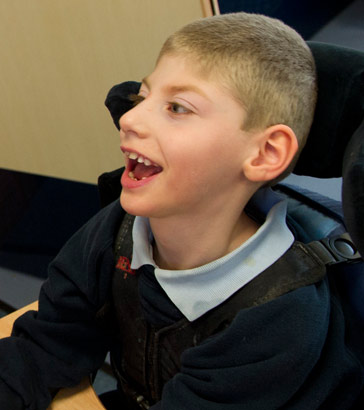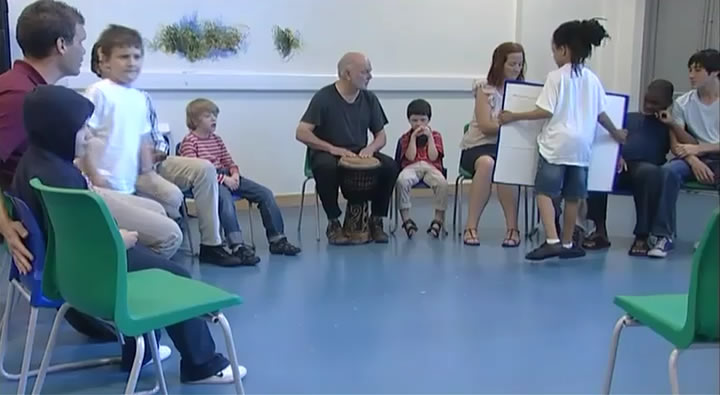Sammy joins a 'call and response' session.
Notice how Sammy calms down when he is being held and contained by a member of staff.

Containment is a very simple but powerful concept in child development, which gives rise to a way of offering practical support to children through an awareness of their emotional distress.
There are two basic elements:
- The 'container' - this is an adult - usually a key person in the child's life - who is able to acknowledge and accept a child's distress and makes experiences safe for them by offering a way, temporarily, to relieve the child of their anxieties, until they are able to understand and control them themselves.
- All the thoughts and feelings that give rise to fears and anxieties and which prevent a child from understanding and managing their own feelings are 'contained' by the adult.

The following example may help you to understand the concept of containment better. Imagine yourself in a new job.
You're in a place you've never worked before, possibly never been in before, with people you've never met, doing a job you know something about but you're not quite clear what is expected of you.
You don't know what support you can expect from your colleagues, your line management or your employer.

Imagine all the feelings and anxieties bubbling away inside as pressure begins to build to the point that initiates an uncontrollable reaction.
Write down the thoughts, feelings and anxieties you would experience either just before you started work or on your first day.
Write down what you think would help to calm the fears and anxieties that you have identified.
Click here for some of the responses from people who have previously done this activity.
- I need to plan a route to work.
- I need the answers to lots of questions.
- I need someone to talk to - a mentor.
- I need to be introduced to my colleagues - who is everybody and what do they do?
- I need to know about the structure of the company.
- I need to know where everything is.
- Can I cope with what I am going to be asked to do?
- I need an induction package.
- I need training.

Your answers may have included the importance of having a mentor or someone identified as a point of reference.
- As adults in the workplace, we all recognise the benefits of having a reassuring figure whose calm manner and presence helps to reduce our anxiety at times of stress or uncertainty. A good mentor can empathise and plan to provide support.
- Exactly the same can be said for children as they face new and unfamiliar experiences, whether they are children who are able to articulate their feelings and anxieties or children with very limited means of communication, who rely heavily upon their emotional interactions with others to feel safe and secure.
- Some children with complex needs, may experience uncertainty and anxiety on a weekly or daily basis.

- Some children may experience uncertainty and anxiety in relation to every change that takes place throughout the course of the day.
If we can recognise the anxiety caused by new and unfamiliar experiences within ourselves, as adults with all our emotional resources, we can begin to appreciate and understand the responses of children to uncertainty and change.
Think back to the first time that you worked with children with complex needs. What kinds of things made you anxious? What kinds of support helped you to overcome your fears?
If you have not yet worked with children with complex needs, make a list of those things which make you anxious about the prospect.
What kind of support would help you to overcome your anxiety?
for their children's anxieties

Parents become aware of their baby's distress and anxiety through behaviours which communicate the child's internal experiences, their fears and anxieties, e.g. through crying, not feeding, not sleeping, restlessness, etc.
Through the baby's behaviours, its feelings are described as being projected into the parent. In a sense the baby is saying, 'Help me. I can't understand what these thoughts and feelings mean but they scare me'.
In response, parents may then try to calm or 'contain' the baby, e.g. by picking the baby up, talking and making soothing noises, all the time being aware of what the baby responds to and repeating what is successful as the baby calms. All this takes place within a non-verbal context where feelings are expressed physically.
Through such behaviour, parents become 'containers' for the child's anxieties.

Adults working with children with complex needs need to learn how to respond to and 'contain' children's fears and anxieties so that something which is confusing and frightening to a child can be made more understandable and predictable for them.
Containment can turn experiences that children find frightening or which cause them anxiety, into nurturing experience that encourage growth and understanding.
Containment provides us with an initial framework for understanding and responding to children's behaviour. It also demonstrates the importance of the adult's capacity to contain not only their own fears and anxieties but also those of the children.
